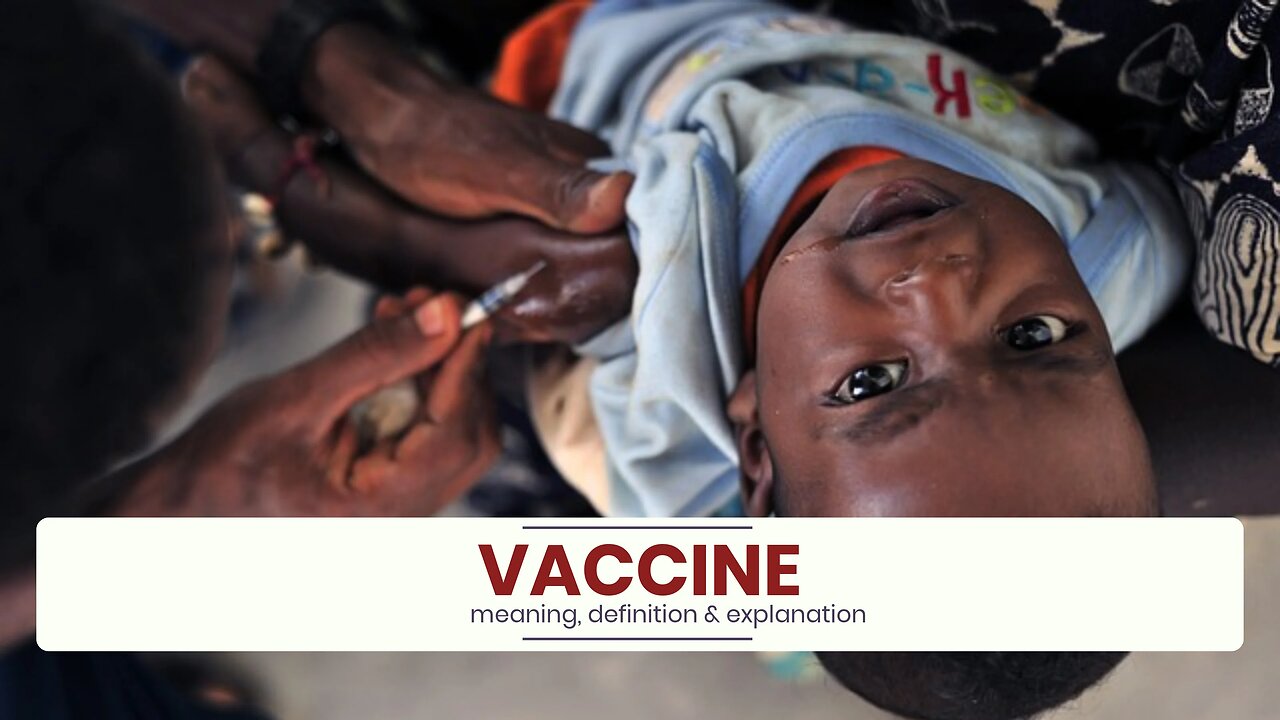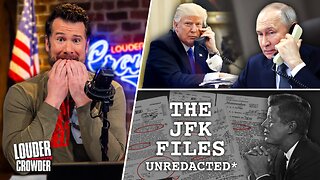Premium Only Content

What is VACCINE?
✪✪✪✪✪
http://www.theaudiopedia.com
✪✪✪✪✪
What does VACCINE mean? VACCINE meaning - VACCINE definition - VACCINE explanation. What is the meaning of VACCINE? What is the definition of VACCINE? What does VACCINE stand for? What is VACCINE meaning? What is VACCINE definition?
A vaccine is a biological preparation that provides active acquired immunity to a particular disease. A vaccine typically contains an agent that resembles a disease-causing micro-organism and is often made from weakened or killed forms of the microbe, its toxins or one of its surface proteins. The agent stimulates the body's immune system to recognize the agent as a threat, destroy it, and keep a record of it, so that the immune system can more easily recognize and destroy any of these micro-organisms that it later encounters. Vaccines can be prophylactic (example: to prevent or ameliorate the effects of a future infection by any natural or "wild" pathogen), or therapeutic (e.g., vaccines against cancer are being investigated).
The administration of vaccines is called vaccination. The effectiveness of vaccination has been widely studied and verified; for example, the influenza vaccine, the HPV vaccine, and the chicken pox vaccine. Vaccination is the most effective method of preventing infectious diseases; widespread immunity due to vaccination is largely responsible for the worldwide eradication of smallpox and the restriction of diseases such as polio, measles, and tetanus from much of the world. The World Health Organization (WHO) reports that licensed vaccines are currently available to prevent or contribute to the prevention and control of twenty-five infections.
The terms vaccine and vaccination are derived from Variolae vaccinae (smallpox of the cow), the term devised by Edward Jenner to denote cowpox. He used it in 1798 in the long title of his Inquiry into the...Variolae vaccinae...known......the Cow Pox, in which he described the protective effect of cowpox against smallpox. In 1881, to honour Jenner, Louis Pasteur proposed that the terms should be extended to cover the new protective inoculations then being developed.
The immune system recognizes vaccine agents as foreign, destroys them, and "remembers" them. When the virulent version of an agent is encountered, the body recognizes the protein coat on the virus, and thus is prepared to respond, by (1) neutralizing the target agent before it can enter cells, and (2) recognizing and destroying infected cells before that agent can multiply to vast numbers.
When two or more vaccines are mixed together in the same formulation, the two vaccines can interfere. This most frequently occurs with live attenuated vaccines, where one of the vaccine components is more robust than the others and suppresses the growth and immune response to the other components. This phenomenon was first noted in the trivalent Sabin polio vaccine, where the amount of serotype 2 virus in the vaccine had to be reduced to stop it from interfering with the "take" of the serotype 1 and 3 viruses in the vaccine. This phenomenon has also been found to be a problem with the dengue vaccines currently being researched, where the DEN-3 serotype was found to predominate and suppress the response to DEN-1, -2 and -4 serotypes.
-
 1:41
1:41
The Audiopedia
9 months agoWhat is PUBLIC DEBT?
53 -
 14:53
14:53
Bearing
6 hours agoPHALLUS NIGHT at the Lady Spa 🤣 Seedy San Francisco Does it Different 🍆
8.12K24 -
 1:04:26
1:04:26
Timcast
4 hours agoCIA On LOCKDOWN, Armed Man Attacks HQ In Langley, SWAT Deployed | Timcast
222K265 -
 1:55:25
1:55:25
Steven Crowder
6 hours agoJFK Files Dropped: Examining the Biggest Claims & Trump Putin Call Breakdown
565K410 -
 54:00
54:00
The Rubin Report
5 hours agoElon Musk Confirms Ugly Rumor of How Biden Abandoned Astronauts
112K71 -
 58:53
58:53
VINCE
7 hours agoDan Bongino Wasn’t Bluffing: Cutesy Time Is OVER At FBI | Episode 3 - 03/19/25
448K753 -
 1:08:50
1:08:50
Grant Stinchfield
4 hours ago $4.21 earnedElon Musk - The Threat of Assassination Has Never Been Greater
71.8K21 -
 2:57:57
2:57:57
The Dana Show with Dana Loesch
4 hours agoTRUMP RELEASES CLASSIFIED JFK FILES | The Dana Show on Rumble!
56K4 -
 38:52
38:52
The Boomer Effect
1 day agoGen Z Cancer Survivor Offers Hope to AYA's 18-39 Cancer Patients
16.2K1 -
 2:02:20
2:02:20
LFA TV
19 hours agoJUDICIAL COUP! | LIVE FROM AMERICA 3.19.25 11AM
107K51